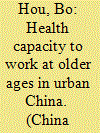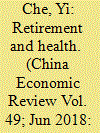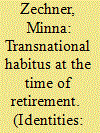|
|
|
Sort Order |
|
|
|
Items / Page
|
|
|
|
|
|
|
| Srl | Item |
| 1 |
ID:
112078


|
|
|
|
|
| Publication |
2012.
|
| Summary/Abstract |
The dramatic rise in life expectancy and longer retirement has created serious concerns about the long-term affordability of public sector pensions. Drawing on insights from a recent inquiry into public sector pension reform, commissioned by the Conservative-Liberal Democrat Coalition and led by the author, this article outlines the challenge faced by policy makers and sets out how it should be addressed. It argues that, with 12 million people active in this part of the pensions system, and estimates that the gap between contributions and payments will grow from £3bn to £10bn in the next decade, the government has no choice but to enter the 'lions' den' of pensions' policy. It contends that any long-term solution is to be crafted cannot be based solely on economics, but must also answer fundamental questions of ethics and equity.
|
|
|
|
|
|
|
|
|
|
|
|
|
|
|
|
| 2 |
ID:
182730


|
|
|
|
|
| Summary/Abstract |
Tapping into the older workforce is a potential economic solution to population aging, but its feasibility depends on the health capacity to work among older people. Existing estimations in OECD countries involve establishing the relationship between work and health on a younger cohort, extrapolating the relationship to older individuals, and deriving the excess health capacity as the difference between predicted and actual employment rates. However, benchmarking on the younger cohort is sub-optimal because the observable retirement-health relationship changes with age. The dual nature of the Chinese social security system provides us with a relatively neat benchmark, allowing us to estimate the excess health capacity among urban workers benchmarking on rural residents in the same age range. Using the China Health and Retirement Longitudinal Study, this choice, combined with other fine-tuning, yields significantly lower but still substantial excess capacity among older urban workers than benchmarking against younger cohorts. Altogether, among urban Chinese aged 45–69, 31.2 million extra workers can potentially be added to the workforce.
|
|
|
|
|
|
|
|
|
|
|
|
|
|
|
|
| 3 |
ID:
149290


|
|
|
|
|
| Publication |
New Delhi, IDSA, 2016.
|
| Description |
104p.pbk
|
| Series |
IDSA Monograph Series no; 54
|
| Standard Number |
9789382169673
|
|
|
|
|
|
|
|
|
|
|
|
Copies: C:2/I:0,R:0,Q:0
Circulation
| Accession# | Call# | Current Location | Status | Policy | Location |
| 058905 | 355.22/SOF 058905 | Main | On Shelf | General | |
| 058906 | 355.22/SOF 058906 | Main | On Shelf | General | |
|
|
|
|
| 4 |
ID:
178415


|
|
|
|
|
| Publication |
New Delhi, Lancer Publishers and Distributors, 2021.
|
| Description |
xix, 83p.pbk
|
| Standard Number |
9788170623328
|
|
|
|
|
|
|
|
|
|
|
|
Copies: C:1/I:0,R:0,Q:0
Circulation
| Accession# | Call# | Current Location | Status | Policy | Location |
| 060011 | 327.54051/TIK 060011 | Main | On Shelf | General | |
|
|
|
|
| 5 |
ID:
161826


|
|
|
|
|
| Summary/Abstract |
One typical feature of China's pension system is that retirement is mandatory. By exploiting the exogenous change created by this mandatory retirement policy, we use the mandatory retirement age as an instrument for retirement status to examine the effect of retirement on individual health using data from the China Health and Nutrition Survey (CHNS). Our main finding is that the probability of “fair” or “poor” self-reported health among white-collar workers decreases by 34 percentage point after retirement. This result is generally robust to different model specifications, alternative measures of health, and different subsamples. In addition, we deliver evidence that increased health-related exercises and the cultivation of a better lifestyle are two possible channels through which retirement affects health.
|
|
|
|
|
|
|
|
|
|
|
|
|
|
|
|
| 6 |
ID:
075803


|
|
|
|
|
| Publication |
2006.
|
| Summary/Abstract |
Often an economic agent dissatisfied with an endowed distribution of utilities desires to optimize this distribution by transferring income or resources across individuals or states of the world. This multi?state optimization theme recurs in a wide variety of economic contexts, ranging across taxation and income distribution, international trade and market disruption, labor contracts and unemployment insurance, Rawlsian design of social contracts, provision for retirement, and many others. Because analyses of such topics are frequently so context driven, the generality of this theme seems to have gone unnoticed and, of a particular paradoxical result, unappreciated. One example of this paradox is how lump?sum distribution in a first best environment will reverse the preference rankings of the endowed distribution of utilities - after redistribution the originally 'bad' outcomes become preferred to originally better ones. Or as another example, if fair insurance is available, the rational resource owner will buy so much insurance that the otherwise 'bad' contingency becomes preferred. This paper examines the underlying structure common to such contexts.
|
|
|
|
|
|
|
|
|
|
|
|
|
|
|
|
| 7 |
ID:
155074


|
|
|
|
|
| Summary/Abstract |
International mobility requires the shifting of bodies across places, through life courses and stages, creating individual and collective experiences that become taken for granted. They are habitus, which is the durable deployment of an individual’s body in the world, as well as a scheme of perception, thought and action that is present throughout life, including retirement. This study asks what kind of transnational habitus is visible in the narratives of interviewed older adults at the time of retirement. The answer is sought by analysing life stories of mobility from older adults who live or have lived abroad for several years. The multilocal transnational habitus of interviewees rests on their desire to maintain their mobility when retired. However, both their physical and mental international mobility are at risk when faced with an ailing body and mind, and policies allow and restrict the transferability of benefits and accessibility to services.
|
|
|
|
|
|
|
|
|
|
|
|
|
|
|
|
|
|
|
|
|